Sick of getting stuck in rush hour traffic?
There’s no denying it: our daily commute is often one of the least enjoyable parts of our day. However, if you’re sick of driving and want to make the switch to a motorbike or scooter, you might be stuck on which of those is the right choice for you.
That’s why we’ve put together this blog, highlighting the benefits of scooters and motorbikes so you know which suits your daily commute best!
Which Bike Should I Choose?
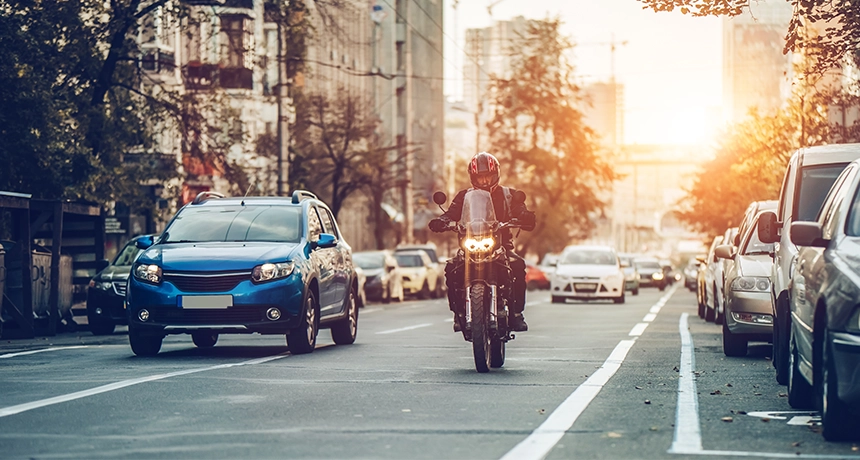
When it comes to choosing between a scooter and a motorcycle for commuting, there’s no one right answer. What’s best for you depends on a range of factors, including your budget, your riding style and where you’re commuting from. If you’re not sure where to start, read our guide to choosing your first motorcycle to help you make a more informed decision.
Whilst we cannot give you a definitive answer on what you should choose, we have laid out the key differences between a scooter and a motorbike – to help make your decision a little easier.
Cost comparison: Scooter vs Motorcycle
As a general rule, scooters are cheaper to buy and run than motorcycles, as they typically have lower top speeds, simpler manufacturing and smaller engines. Plus, scooters will typically have a belt instead of a chain. These do still need maintenance, but less than what would be needed for a motorbike chain.
However, it’s important to take your own personal riding style into consideration, as this may impact your riding costs. For example, if you’re frequently along bumpy roads, a scooter may be more likely to sustain damage than a motorbike.
Buying the Bike
Thanks to their simpler design and smaller engine sizes, scooters tend to have a cheaper initial cost than motorbikes. So, if you’ve got a lower budget, a scooter may be the right choice for you.
Verdict: Scooter wins.
H3: Road Tax & MOT
At the time of writing, the maximum amount MOT test stations are allowed to charge for a motorcycle or scooter without a sidecar is £29.65.
Meanwhile, road tax is calculated based on engine capacity. For example, if you have a scooter or motorbike under 150cc, you’ll currently pay £26 for the year. This means that you should pay the same road tax whether you get a motorbike or scooter – as long as the engine size is in the same band.
However, motorbikes do have bigger engines than scooters on average, so it’s probably going to be easier to find a scooter in a lower tax band.
Verdict: Draw
Fuel Efficiency
Typically, scooters will offer better fuel efficiency than a motorbike. As a general rule, scooters tend to have smaller engines and weigh less than the typical motorbike, they require less fuel to operate. Motorbikes also prioritise power more than scooters do, which can lead to a lower fuel economy.
However, many smaller capacity motorbikes are highly fuel efficient – such as the Honda CB125F, which we recently had the opportunity to review. Manufacturers claim that this bike can deliver 151.1mpg, which should be more than enough for your daily commute.
So, while scooters as a whole do tend to have better fuel efficiency, you can find motorbikes that do just as well.
Verdict: Scooter wins
Electric Bike Considerations
If you’re more environmentally conscious, you might want to consider getting an electric bike. While these do tend to be more expensive to buy than a petrol bike, they do tend to be cheaper to run and maintain.
There are some drawbacks to electric motorbikes and scooters – charging can take a while, and they tend to have a shorter range than petrol bikes – but they can be a really great option for an inner-city commuter.
Insurance Costs
As they’re less powerful than motorbikes, insurers typically see scooters as less risky – making them cheaper to insure. However, it’s important to remember that insurance quotes can vary greatly based on a number of factors, including your age, your history and the make and model of the bike you're trying to insure, among other factors.
As a general rule, the coverage you would personally be offered for a scooter may be cheaper than the coverage you would be offered for a motorbike, but it's always good to do your research beforehand to see if this is the case.
Verdict: Scooter wins
Consider your Commuting Environment
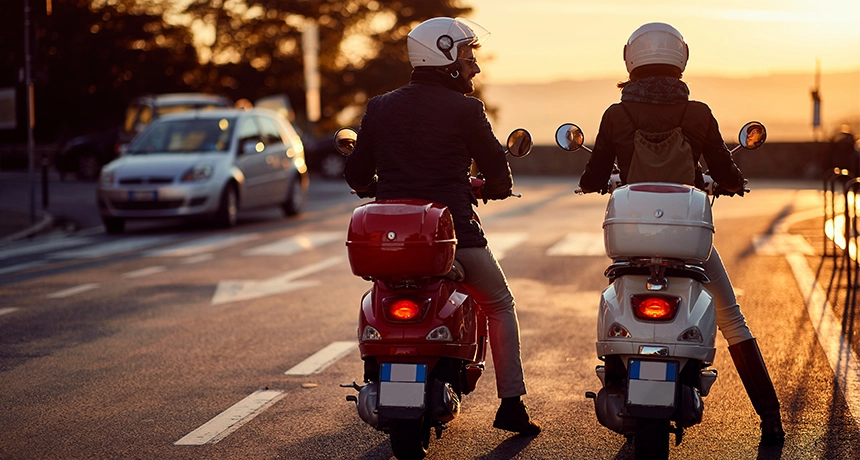
The right bike for you can depend hugely on where you’re based.
For an inner-city commuter, the agility of a scooter will be much more pleasant to ride in heavy traffic and around tight corners. However, if you’re travelling along slightly bumpier roads, the larger wheels of a motorbike will keep you feeling much more stable.
Below, we are going to be running down a few things you should consider before making the decision on which two-wheeler is best for you:
Will you be riding on motorways or dual carriageways?
The first question you’re going to need to ask yourself is regarding what type of roads you will be commuting to and from work on. If you’re going to be riding on motorways or dual carriageways as part of your commute, a motorbike will be a better choice for you.
On a motorway, a motorbike will offer a more comfortable and stable ride than a scooter would, and you’ll find it much easier to keep pace with traffic. Although there are scooters out there that can handle higher speeds, the design of a motorbike – with its larger wheels and larger engine size – is much more suited to that environment. Plus, if you're looking at scooter and moped options with a smaller engine, it's worth noting that anything 50cc or under is not allowed on the motorway.
Verdict: Motorbike wins
Do you live and/or work within a city?
When commuting in and around a city, you’ll likely find a scooter to be a better option.
Most scooters are usually automatic, making them easier to use in the stop-start traffic of a city environment, and as they’re lighter and more nimble, a scooter will be a better choice for turning tight corners and navigating busier environments.
Verdict: Scooter wins
How long is your everyday commute to work?
Another important factor to take into consideration is the length of your commute. If it takes you a little longer to get to work, you’ll probably find a motorbike is better for you – especially if your commute involves higher speeds.
A motorbike will typically be more comfortable than a scooter when riding for extended periods, which is super important if you’re going to be riding your bike to work every day.
Verdict: Motorbike wins
How much gear/equipment do you take with you to work?
If you have the kind of job where you have to carry a lot of equipment with you to work, we’d recommend buying a scooter.
Scooters usually have under-seat storage, bag hooks and space for a top box or rear rack, while motorbikes will have significantly less space (although touring bikes often have the option for external space for luggage).
This makes scooters significantly more convenient for a daily commute, as it gives you the space you need to store your daily essentials.
Verdict: Scooter wins
Which is easier to ride: Motorbike or Scooter/Moped?
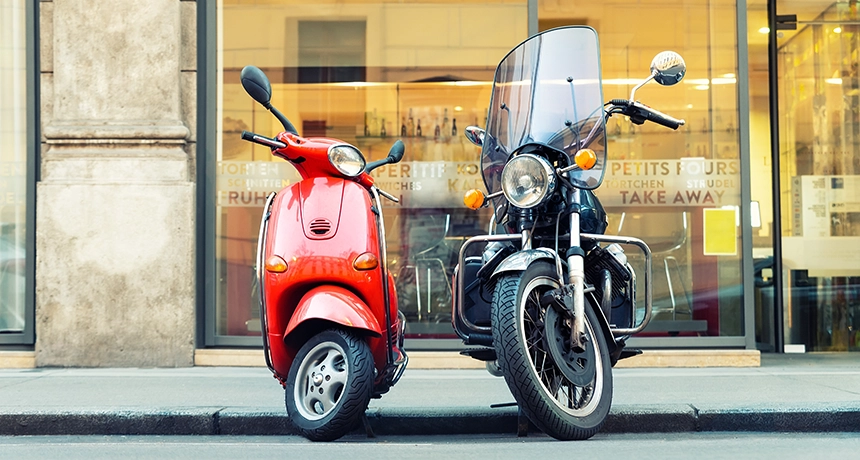
Technically, riding a scooter is easier than riding a motorcycle.
Scooters are lighter than motorcycles and have smaller wheels, which makes them easier to manoeuvre, and an automatic transmission means they’re more beginner-friendly.
However, if you’re used to motorbikes, then having less control over your riding experience may be a bit of a disorienting experience for you, and it may be a bit of a learning curve to get used to the new style.
So while scooters are easier to ride on paper, it does depend hugely on your own personal experience.
Do motorcycles have gears?
Most motorcycles have gears, which can be shifted using manual transmission.
On a motorbike, this involves a clutch lever on the left handlebar, and a gear shift lever by your left foot. Typically, a motorbike will have five or six gears, but this can vary.
Manual transmission will offer you more control over your ride which, for a more experienced rider, will likely make for a better experience. However, learning how to operate the gears can be a bit of a learning curve, particularly if you’re frequently riding through traffic as part of your commute.
However, some bikes, such as the Honda Africa Twin, have an automatic transmission option, but this is less common.
Do mopeds/scooters have gears?
Most mopeds and scooters use twist-and-go transmission, meaning that they don’t have gears. As the name suggests, instead of manually shifting gears, you twist the throttle to accelerate.
This is a great option for anyone who’s more of a beginner, particularly if you’re going to be commuting in and around busy urban areas and need more road awareness. However, you will find that it accelerates slower than a motorbike.
Benefits of riding a scooter for urban commuting
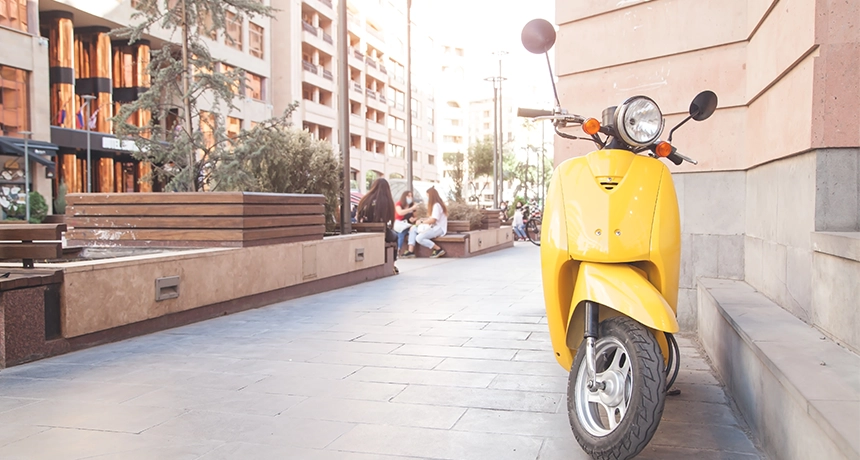
There are a lot of benefits to riding a scooter on your daily commute, as they offer a convenient and cost-effective way of getting around a city environment.
How fast can a commuter scooter/moped go?
The speed of a commuter scooter can vary significantly depending on engine size. However, you’d be surprised at just how fast a scooter can go!
At the lower end of the scale, a CBT-restricted 50cc moped can reach speeds of 28mph, while a 125cc scooter can often reach speeds of around 60 to 70mph – meaning that it can more easily keep pace with city traffic. You’ll typically be able to get from 0-30mph pretty quickly, but it may take a little longer to get up to your top speeds.
Better for inner-city urban riding
Thanks to their agility, fuel efficiency and ease of use, scooters tend to be a stronger choice for inner-city riding.
Scooters are probably some of the easiest bikes to handle, due to their smaller wheelbase and lighter weight. Their automatic transmission also makes them more straightforward to operate in heavy traffic than a motorbike.
Comfortability/Riding Experience
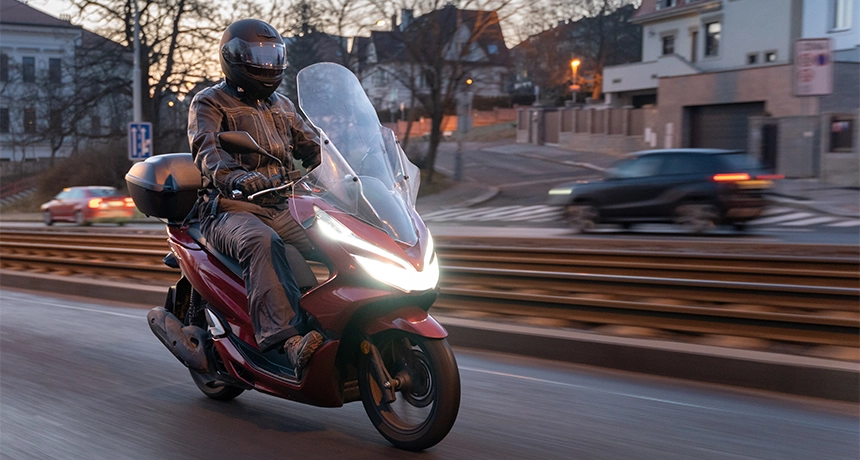
For everyday, short-distance journeys like your morning commute, a scooter is pretty ideal.
Typically, a scooter will have a more upright riding position than a motorbike, meaning that your ride on a scooter should place less strain on your back, neck and wrists than the forward-leaning position you may have to adopt on a motorbike. This should make for a more relaxed and comfortable riding experience.
Additional protection
Arguably, one of the most glaring visual differences between a motorbike and a scooter is the frame.
A scooter’s step-through frame is much easier to mount and dismount than the step-over frame of a motorbike (great if you’re having to make quick stops!).
Larger storage space
Scooters normally have more built-in storage than motorcycles. Most are designed with ample under-seat storage – often enough to hold a full face helmet – as well as space for a top box.
If you’re someone who has to carry more equipment with them for work, a scooter could be significantly more convenient than a motorbike.
Scooter maintenance costs tend to be lower
Scooters tend to have a simpler design than motorbikes, with fewer moving parts – making them cheaper to maintain. They also tend to need maintenance less frequently than a motorbike would, reducing costs further still.
Downsides to commuting on a scooter/moped
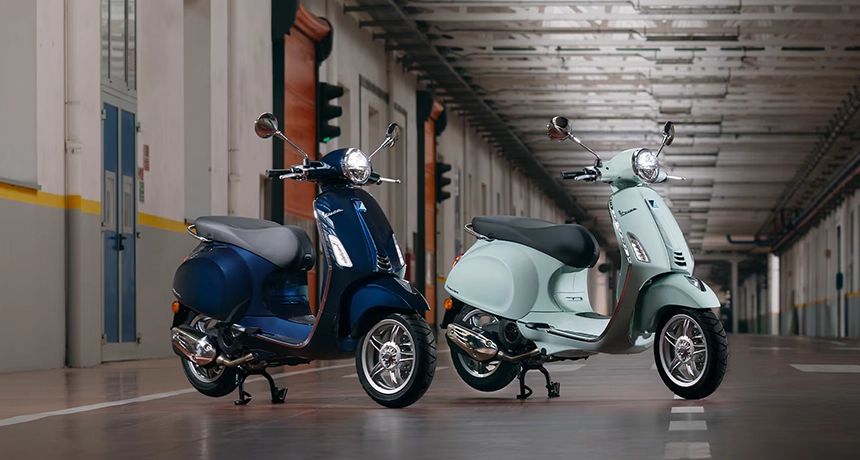
While there are a lot of benefits to commuting on a scooter or moped, there are also some drawbacks. Depending on what your journey to work looks like, a scooter may not be the right choice for you.
Lower top-end speed
As they’re designed with urban commuting in mind rather than power, scooters tend to have lower top speeds than motorbikes.
This shouldn’t be too much of a problem if you’re commuting within a city, but if you have to travel longer distances or use the motorway on your way to work, you might be after something with a slightly bigger engine. If you are commuting to work via a motorway, you'll want to ensure you choose a scooter above 50cc at a minimum, as anything 50cc or below is not legally permitted on motorways.
Maxi scooters/adventure scooters can be heavier
When choosing your scooter, it’s important to pick the one that suits your lifestyle best. You may be tempted to go for a scooter with a larger engine, but while maxi scooters can be great for touring they’re larger and heavier – making them far less suitable for commuting.
Smaller wheels
Although the smaller wheels of a scooter are great when navigating tight corners and busy streets, they’ll feel less stable than the larger wheels of a motorbike when going at higher speeds or on rougher terrains.
If you’re someone whose daily commute involves winding country lanes, a scooter could give you a more uncomfortable riding experience than a motorbike would, and you might feel a little less planted on the road.
Advantages of commuting on a motorcycle
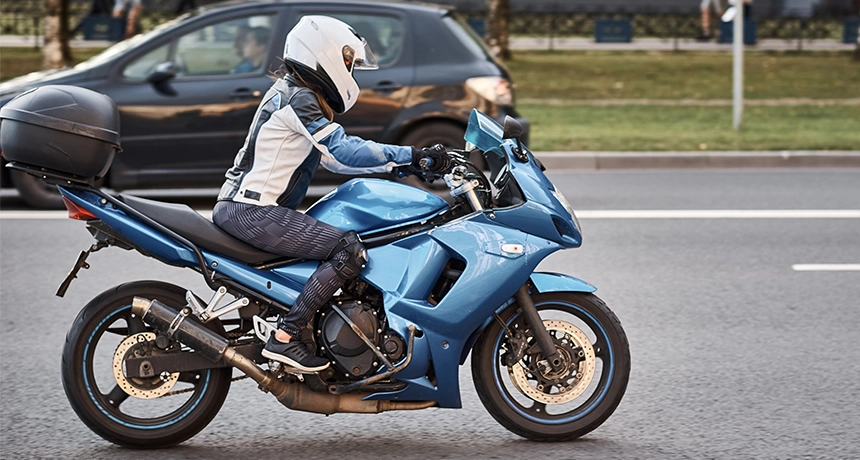
If you want something that gives you more power – and a lot more control – then a motorbike may be more your speed. Speaking of speed…
Motorcycles can achieve higher speeds
What a motorbike may lack in the convenience of a scooter, it more than makes up for in power. Larger wheels and bigger engines equal a higher top speed. If you’re travelling down the motorway on your commute, you’ll likely feel more stable on a motorbike.
Improved Ergonomics
With a larger variety of riding positions, more customisation available and a prioritisation on balance and control, motorcycles tend to offer better ergonomics. If you’re having to navigate diverse riding conditions or travel at high speeds, a motorbike will likely be a more comfortable option for you.
Handling abilities
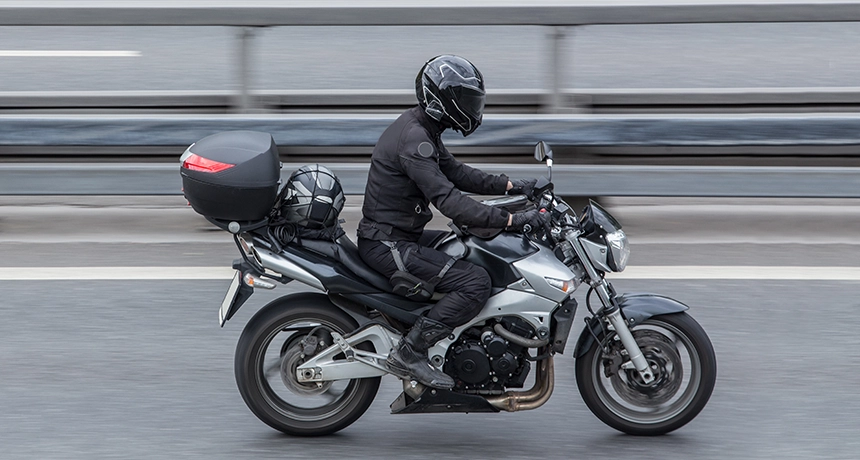
With larger wheels, more advanced suspension systems and better braking systems, motorbikes typically handle better than scooters – especially at higher speeds.
Although scooters can be easier to manoeuvre if you’re commuting within a city, the precise handling of a motorbike makes it very well suited to anyone travelling to work in a less urban area.
Downshifting
Thanks to its manual transmission, you have more control over your riding experience on a motorbike than on a scooter – and that includes downshifting. This helps slow your motorbike more effectively and provides you with more torque and power.
However, when downshifting it’s important to get it right, as doing it incorrectly can lead to jerking or cause the rear wheel to lock up.
Wheels tend to be bigger
This might sound obvious, but motorbikes have much larger wheels than scooters. Because of this, they have better shock absorption, improved handling and offer a more stable ride on uneven roads.
This also contributes to the higher top speeds of motorbikes, as the wheels have to turn less than the wheels of a scooter would have to in order to reach the same speed.
However, the downside to larger wheels means you have to put more effort into turning, so if you’re someone who’s more central and regularly riding down busy city streets, the cons may outweigh the pros here.
Larger variety to choose from
With a scooter, what you see tends to be what you get. There are some variations – maxi scooters being one example – but you don’t get the same level of variety you get with a motorbike.
Meanwhile there are seven main types of motorbike – adventure bikes, tourers, naked bikes, cruisers, classics, sportsbikes and customs – so your choice of motorcycle can be much more suited to your own specific needs than a scooter can.
Disadvantages of riding a motorcycle for urban commuting
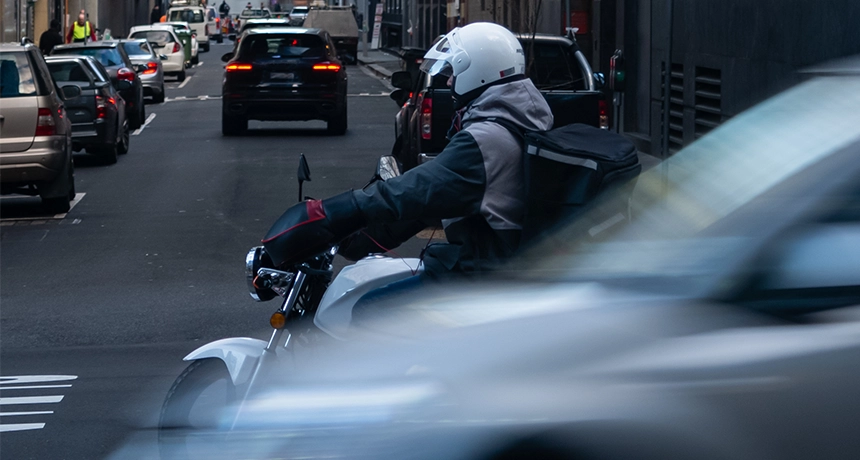
Although a motorbike can be a great option for your commute, they’re not for everyone. With a higher price point, a lower amount of storage space and less of a focus on comfort, you might find that owning a scooter is a better option for you.
Higher maintenance costs
There’s no getting around it: owning a motorbike can be expensive.
Unlike a scooter, a motorcycle has chains and a gearbox, requiring more frequent maintenance. A larger engine also means more of everything: more oil, more petrol and more components than can be expensive to repair or replace.
However, it’s worth noting that the maintenance for a motorbike is, in most cases, cheaper than maintaining a car, so don’t let the price point put you off.
Limited storage space
For commuters, one of the biggest downsides of a motorbike is the amount of storage space they offer.
Motorbikes don’t have the same level of storage built in as scooters, making it much more challenging to bring items to work with you. Some touring bikes may have built-in storage capabilities, and many will have the space to support accessories like tail bags and top boxes.
So while it’s not impossible to have a decent level of storage on a bike, it is a little more challenging.
Less comfortable
Although a motorcycle is fun to ride, they’re not always the most comfortable. Shifting gears and a step-over design makes riding a motorbike a lot more demanding than riding a scooter.
However, touring bikes are designed with rider comfort in mind, and naked bikes tend to have a more upright riding position to reduce strain, so this often does really depend on the style of bike you’ve gone for. If you’re not sure what bike to buy, read our article on choosing your first motorbike.
The Last Stop!
So there you have it. I hope you enjoyed this article outlining the key differences between motorbikes and scooters for commuting.
One last thing to remember before you go – whether you’re looking at getting either a motorbike or a scooter, you can get an insurance quote direct with Lexham!







